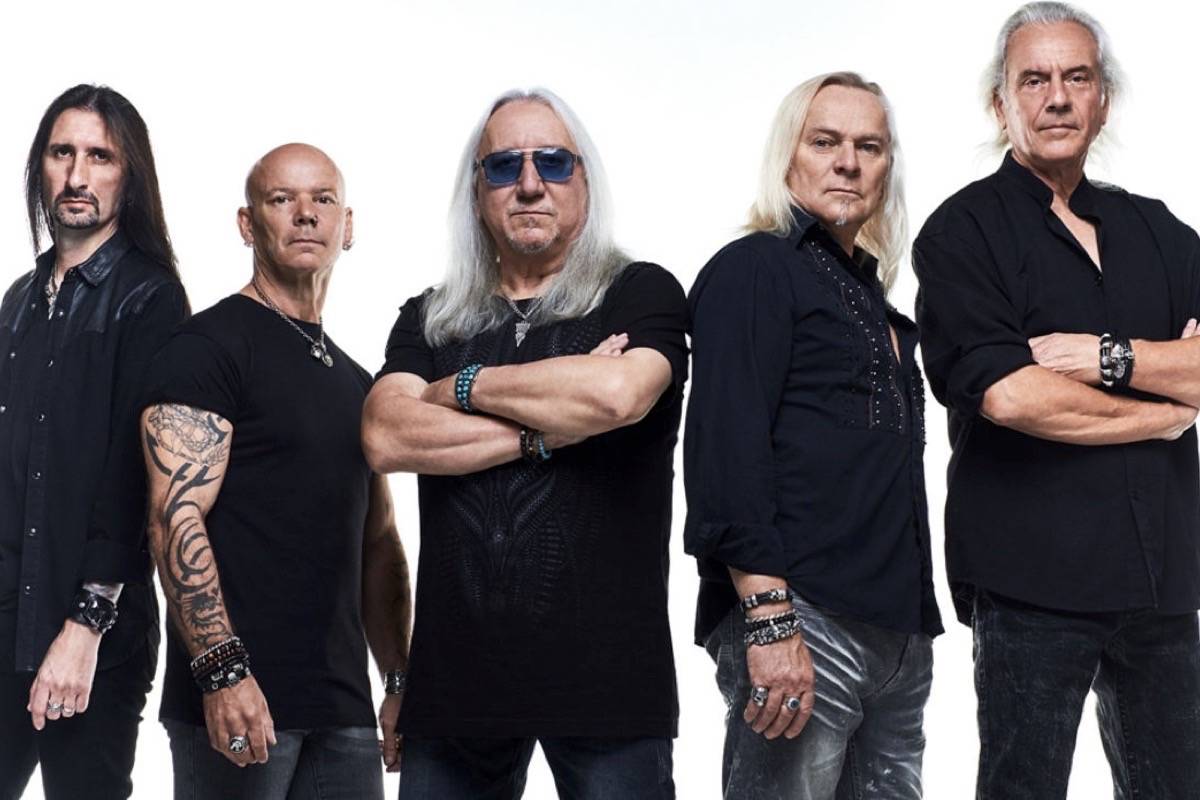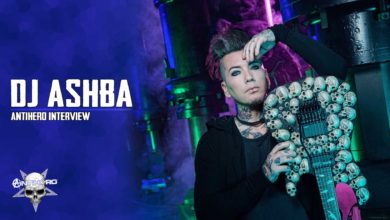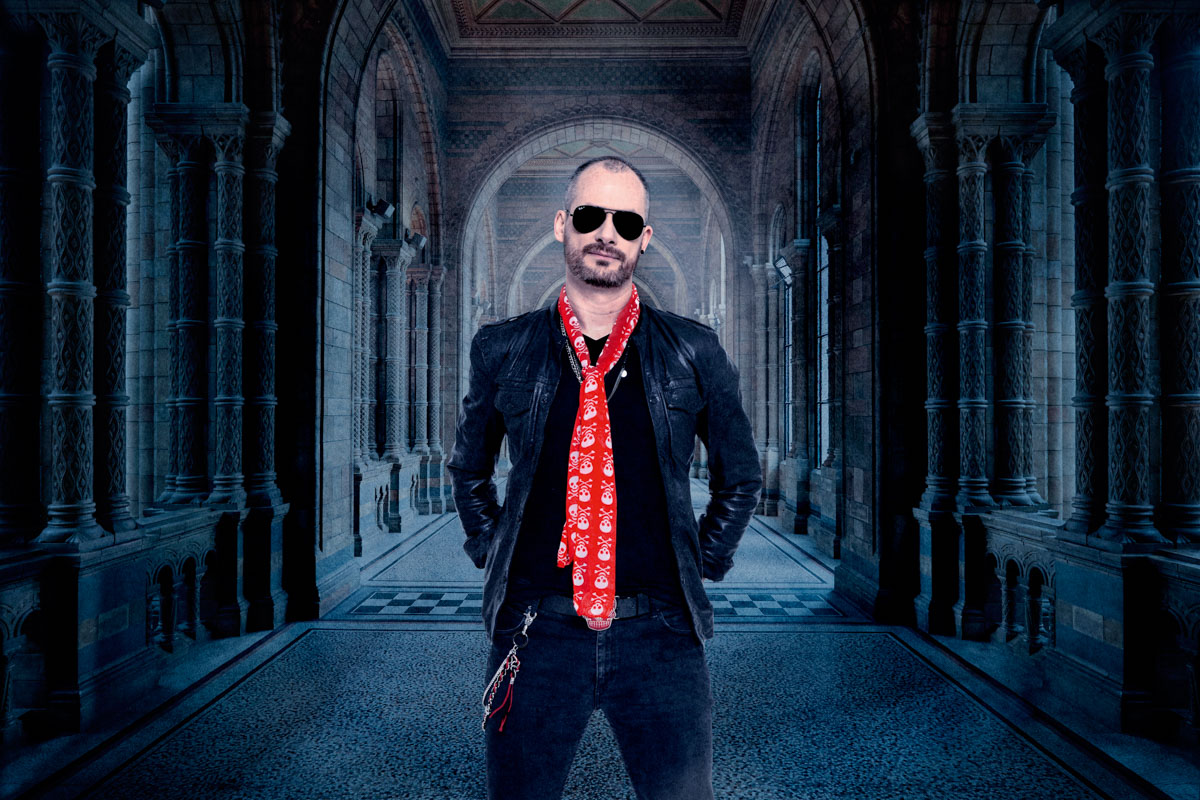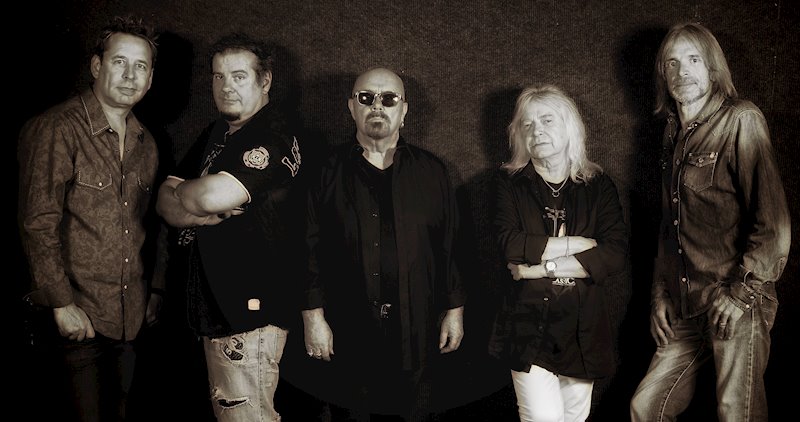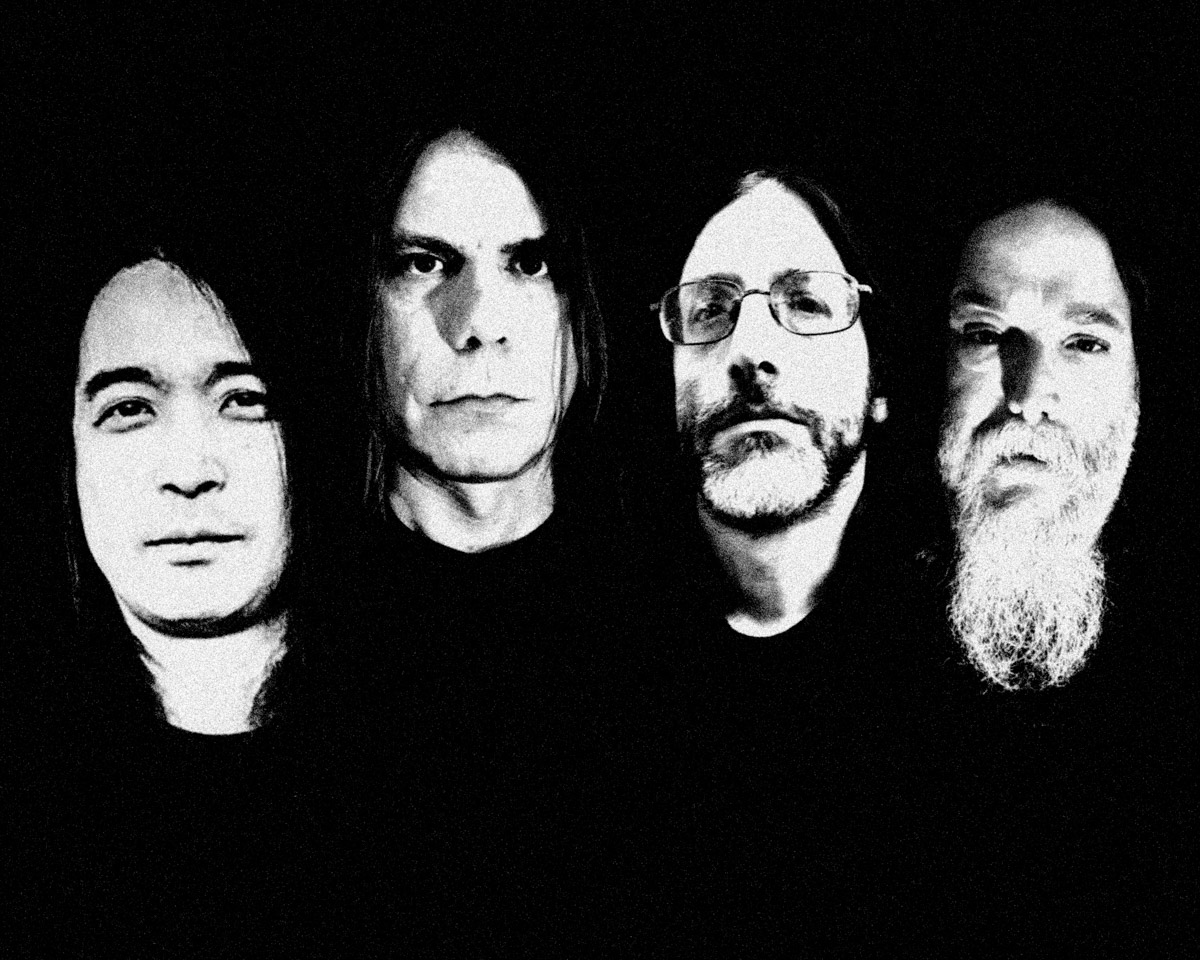British hard rock legends Uriah Heep are one of the “big four” rock bands, along with Led Zeppelin, Deep Purple and Black Sabbath, and certainly one of the most intriguing bands both musically and lyrically, to emerge from heavy rock.
This extensive and ambitious super deluxe box set celebrates Uriah Heep’s remarkable career and was created with the full collaboration of Uriah Heep themselves and curated by founding members Mick Box, Ken Hensley, Paul Newton and Lee Kerslake,
 The beautifully presented box set contains 25 CD albums including 4 CDs compiled by the original members, plus all the studio albums and live 1973. This set also includes “The Magician’s Birthday” LP, remastered by renowned engineer Andy Pearce of Lou Reed and Black Sabbath fame, with re-imagined artwork by Roger Dean, two art cards, and a 78-page book featuring rarities from the band’s personal archives.
The beautifully presented box set contains 25 CD albums including 4 CDs compiled by the original members, plus all the studio albums and live 1973. This set also includes “The Magician’s Birthday” LP, remastered by renowned engineer Andy Pearce of Lou Reed and Black Sabbath fame, with re-imagined artwork by Roger Dean, two art cards, and a 78-page book featuring rarities from the band’s personal archives.
“This 50th Anniversary box set fills me with immense pride and takes me on a musical journey I could never have imagined. We are still on that magical adventure, but reaching our 50-year Anniversary is something to be proud of and an amazing achievement. It has been a roller coaster ride that as we stand today has no ending, so we proudly celebrate our 50th Anniversary with this stunning box set that BMG have worked so hard to put together while remembering all of the wonderful musicians including those that are in rock n’ roll heaven, that have been a part of this fantastic milestone. ‘Appy days!” exclaims Mick Box.
“Sitting here, just a few days from my 75th birthday, it’s easy for me to flashback 50 years to when me, Mick, David, Gary and Lee really knew we were on to something big and amazing!
What makes it even easier is the incredible boxed set that BMG has put together to celebrate this massive milestone.
The box is a perfect tribute to a band that achieved what so few have done, to Mickie and the boys who keep the legend rolling and of course, to all of you who made it possible.
My sincere and humble thanks to all concerned.” – Ken Hensley.
Evoking an era when prog, hard rock, and heavy metal co-existed in an era of glorious, boundary-breaking music, the box set traces the evolution of Uriah Heep from inexperienced studio musicians with everything to prove to bona fide limo inhabiting rock stars.
After selling over 40 million albums worldwide, over the years Uriah Heep have influenced many different metal bands around the globe, among the most popular being Dio. Bands including A-ha, King Diamond, Krokus, Demons & Wizards, Fifth Angel, and Axel Rudi Pell have all cited Uriah Heep as a band of personal influence, while W.A.S.P, Tesla and Blackmore’s Night have all covered the band’s songs.
Uriah Heep continue to tour until this day with founding member Mick Box, while Ken Hensley tours extensively as a successful solo artist.
Fifty Years In Rock is a fitting celebration to the unique and often imitated but never equaled Uriah Heep.
To pre-order Uriah Heep’s Fifty Years In Rock go to: https://uriahheep.lnk.to/50YIRPR
I was lucky enough to have the opportunity to chat to founding member and still playing guitar in the band today Mick Box, to reflect on the bands “Fifty Years In Rock”.
ANTIHERO: Good morning, Mick. How are you?
Mick Box: Good morning, mate. I’m good, mate. How are you doing?
ANTIHERO: Not bad. Bit of a difficult time for the world at the moment. I just wondered how you’re spending all this extra time that you have on your hands.
Mick Box: Oh, do you know what? As a big hole appears with nothing in it, it gets filled up with other stuff. So, I’m as busy as ever.
ANTIHERO: What you’ve been up to then? Have you any sort of interests, hobbies?
Mick Box: Well, I’ve had the chance to sort out my office, my music room, write songs, do a lot of writing. I’ve started up this video thing with Lockdown Diaries and then I have Mick’s Monday videos to do, I ask Mick where they can ask me any question they like, and I reply by video on my website. I do cameo things for my cancer charity, which people want to wish them a happy birthday or somebody’s in hospital or it’s an anniversary or something like that and then I do a greeting for them. So yeah, just keeping busy, my friend.
ANTIHERO: You mentioned a few things there and you’ve also got your regular blogs. You seem to have embraced the new technology, which obviously wasn’t around when you first started out in the music business.
Mick Box: Oh, 100%. Yeah. I think it’s the only thing you can do is embrace it. It’s not going away anywhere. I wouldn’t say I’m absolutely brilliant about it, but I can certainly hold my own.
ANTIHERO: Is it something that you’ve really enjoyed, engaging more interactively with the fan base?
Mick Box: I think, yeah, from that end of it it’s great because back in the old days it was a six-month fan letter, wasn’t it?
ANTIHERO: Something like that, yes that’s correct.
Mick Box: The people could get if they joined the fan club, but now it’s immediate, isn’t it?
I mean, just my Ask Mick section, they can just come and ask me any question about anything to do with my life, musical or otherwise, and I can answer them. And the video would be put up within the weekend and happy days. So that immediacy is very good.
ANTIHERO: In recent years we have lost many musical heroes. I’m just wondering if I could ask you about two. One, Lee, that you played with in Uriah Heep, and also then go on and ask you about any memories of Eddie Van Halen. But if we could take Lee, first of all, just wondering if there were any little anecdotes, little personal stories that you can maybe share with somebody who only really knew Lee through the music that you created together.
Mick Box: Yeah. Lee was a lovable guy. He was, I think the fans called him the Bear and that’s what he is, a big bear hug and you knew Lee was around. Was just a lovable guy, didn’t have a harmful bone in his body. He embraced life probably a bit too much, but he enjoyed it. And that’s our Lee. He was just fantastic company to be with. He loved his music. He loved playing drums. He was a superb drummer, of course, one of the top five drummers in the world, in his heyday back in the 70s. So yeah, was just an amazing person.
ANTIHERO: And then as I said, Eddie Van Halen suddenly lost his life recently. As a fellow guitarist, would you have been a fan of Eddie Van Halen? Would you appreciate his technique, what he actually brought to guitar playing?
Mick Box: Well, when he came onto the scene, he reinvented the guitar, didn’t he, basically. He just shook the world up. It was nothing that I ventured into myself, but I could appreciate what he was doing. Was amazing. It’s not my kind of style of playing, or indeed what I I project, but yeah, he was just absolutely incredible, and great songwriting again, and just a brilliant performer. He just shook the world up. He was amazing. He could do it all.
ANTIHERO: Did your paths cross on the touring circuit? I think maybe obviously Van Halen didn’t play in Europe much.
Mick Box: Unfortunately, no, we never crossed on the tour and I never saw him live on stage, unfortunately.
ANTIHERO: Mm-hmm (affirmative). Just returning then to the present; BMG are bringing out a 50 Years in Rock deluxe box set, the band’s legacy. It’s got all the studio albums in there. I just wondered if we could talk to you about it. I see that you’ve contributed to the actual release in that, there are also four CDs on it.
Mick Box: Yeah. It’s an idea that BMG came up with. They asked me, Ken, Paul, and Lee to just pull out the favourite tracks and put them onto a CD. Well, when I was first asked that, well, I didn’t see what the others put on at all. But when I was first asked, I felt, well, it’s a bit obvious they’re going to all put July Morning, Easy Livin’, and Lady in Black, all the ones that were already sort of the known favourites, if you like. And so, I thought I’ll take a different tack with it and I just chose some of the deeper cuts, if you like to call it, for my CD, that I like hearing.
ANTIHERO: In terms of the final physical product, did the record label send you a copy? Have you actually seen that yet?
Mick Box: I’ve had one. They sent me one and it’s marvellous, but I haven’t got the complete finished article yet. So, in other words, I’ve got the prototype, but it looks fantastic.
ANTIHERO: Do you collect, I mean, when the band brings out a new album, every so often over the years, do you collect them yourselves, or is it not something that you’re even interested in having in your own possession?
Mick Box: I usually keep one copy of, to be honest. And it goes in the file and I don’t normally get it out until something like BMG says, “Look, we’re thinking of doing X, Y, Z,” and I’ll listen to it and go, oh, that’s really good. But I don’t put our albums on, on a regular basis at all.
ANTIHERO: How do you feel about the title of the package, 50 Years of Uriah Heep? Does it shock, amuse you that you’re still around and still playing?
Mick Box: It fills me with immense pride, I have to say. Not many bands could have achieved that and we have, and we’ve gone through a lot of ups and downs in our musical life and personal lives and we’re here to tell the tale. So, yeah, I’m absolutely thrilled.
ANTIHERO: How do you view the band’s history yourself? Do you see it as a continuous story of evolution or that it has defined and set different chapters of the band?
Mick Box: I think you’d almost view it as different chapters because of the various lineups and things. But even so, to me, they might just as well named it, This is My Life, and under that, And It’s Not Over Yet, because we’re going to start recording a new album hopefully in February, so, which is what we’re writing for now. So, it’s just a marker, that’s what I see it as. It’s a 50-year marker, but we still have ambition. We still have positive thoughts moving forward and we shall continue to do so.
ANTIHERO: I was going to ask you, I mean, you’ve achieved obviously many goals, dreams, and ambitions. Do you still have those? Are they still as strong as ever as when you first started out?
Mick Box: Oh, absolutely. Absolutely. And I think that’s filed under the word passion. I’ve still got the same passion I had for my music and guitar playing that I’ve always had, and that will never leave me to my dying day, so. And passion drives you on to want to achieve different things and more things, and write better songs and write new songs and put them out there in the world. That’s what life’s all about really, I mean, music is life and life is music. It’s as simple as that.
ANTIHERO: My own introduction to the band, growing up as a young teenager in the 80s, was actually the Live in Moscow album. I just wondered, thinking back on that, how do you view that as part of the band’s legacy? Because it opened a lot of new markets for the band.
Mick Box: Well, the markets were already open, but it made everyone aware that we were the first western rock band to play out in Russia, invited by Glasnost, when Gorbachev and Reagan were having their peace talks however they ended up. And we went over there and we were almost pioneers, if you like, through our success, a lot of the management helped the Scorpions manage to go out and play in 1988. And then, of course, the following year was The Peace Festival with the Bon Jovis and the Motley Crues and Ozzy, and all the rest of it. So, we were kind of pioneers in a way, which was wonderful.
ANTIHERO: You mentioned also that, I mean, the band’s musical legacy is continuing. You mentioned there that a new album is scheduled for February. I just wondered when you’re playing live, is it difficult to find a balance between the old hits and, obviously as a band you’re evolving, you want to play all the new stuff, is it difficult?
Mick Box: Well, there are two ways of viewing it and our viewpoint is that we’re very proud to have that in our history and those songs in our repertoire. So what we tend to do is, we play concerts in 62 countries around the world. You tend to find out what the common denominators of songs that people would like to hear when they come to one of our concerts, i.e. an Easy Livin, a July Morning, or a Gypsy. And then what we try and do is if we’ve got a new album out, we try and intersperse some of the newer tracks into that and then we might even look at some even older tracks and dust them down and bring them into the show too. So the essence of the live show for us is to give a good retrospective of our career from the first album, Very ‘Eavy Very ‘Umble, to the latest one, which, of course, is Living the Dream, at the moment. But then that will be superseded by another album next year, with luck.
ANTIHERO: When you’re writing something like the hits that you’ve mentioned, do you know instantly, oh, that’s a bit special or is it only subsequently it takes on a new life when fans get to hear it, it appears on the album?
Mick Box: It seems to take on a new life when the fans pick up on it, to be honest. When you release an album, you just do the best that you can possibly do at the time. And then it gets released into the world, isn’t it? Then the accolades or the non-accolades, whatever it is, come back to you and you deal with it from that moment on. But I would say occasionally you’ll have a feeling about a song or a certain something that you think, well, hang on, this is speaking really well and this is us on the top of our game sort of thing. But generally, it’s the rapport from the fans and the media alike that really make or break it.
ANTIHERO: A lot of musicians I’ve noted in recent years have taken maybe just a guitar out on the road and they play a series of unplugged-stories and songs events, where they maybe recollect stories from their past, play a few songs. Is that ever something that’s maybe interested you? Just yourself.
Mick Box: Not particularly, no.
ANTIHERO: No?
Mick Box: No. Number one is I don’t play other people’s songs. I never have from day one.
I’ve always stayed away from that so that what I do write, I write on a clean plate if you like. So I’ve never been one of those people that can go out and play like if you go to a party, somebody throws a guitar on you and they expect you to reel off the top 30.
ANTIHERO: I’m thinking more of your own Uriah Heep songs through the years with some stories giving insights to the creation of the particular songs.
Mick Box: I can say to them, look, this is what I was writing this morning, if you’re interested. My own musical legacy? Oh yeah. I mean, not really. I wouldn’t be able to come up with that vocally because I couldn’t cope with all the vocal gymnastics that are required to sing a lot of our songs. So I’d have to go along with somebody like Bernie and do it that way. But I’d rather do it with the band and do it properly than reflect it that way. I was asked at one point, funny enough, prior to COVID hitting, and then I went out and did An Evening with Mick Box, where I went and talked about stories and stuff like that. Now that would far interest me more, doing it that way. And then maybe include some musical bits that had some relevance, if you like.
ANTIHERO: That’s what I was thinking of because I’ve seen a few of those, and they generally seem to work quite well.
Mick Box: Yeah. I mean, that would interest me, you mention it, I kind of like that.
ANTIHERO: Just looking online this morning, I read a couple of your blog entries, are those something that you’ve written down in diaries over the years, or you just naturally have a good memory for everything it seems?
Mick Box: It’s a good memory. Yeah. I’ve never been a diarist. I’ve never kept a diary, but as you said, I’ve just had a very good memory. In fact, many people have told me, “You remember that?”, quite often. “How did you bring that one out of the bag?” But I’ve always had that ability to pull these things through.
ANTIHERO: The next obvious question, and what about the thoughts of gathering all those little blog entries and putting them together in a book one day?
Mick Box: Well, do you know what? This has been said to me I think over the last week about, I’d say, six or seven times. And basically, I started writing a book many times and I get to a point where I just put it on the backburner and go on to something else, like write songs or something. So there is an element of a book in my computer, so to speak, sitting there, waiting to be developed and developed a bit more and developed a bit more. And I think that’s probably how I’m going to do it because I don’t really have the attention span to sit down and just donate the next four weeks to finishing the book, if you like.
So yeah, it’s one of those things that it takes a lot of energy out of you to do it, and I always find somewhere else to put my energy, but that’s not to say it won’t get done. And also, I just want to write, obviously, about how I got into music, et cetera, then you get to a point where it’s just the band kicks in and I’d rather write about all the positive, funny stories rather than harking any of the nastiness that lots of people do. I mean, lots of people that write a lot of the autobiographies, you can see they’re very talented, they get a lot of money, they get into drugs, they destroy a lot of people’s lives and theirs, but then they find God and then they go to God and they’re fine. There are so many books out there that follow that path. I never did that. So I can only sort of write it in a very humorous way.
ANTIHERO: Yeah. Of course, we mentioned earlier, touring plans are on hold for God knows how long. I just wondered if the band had mapped out any special plans to mark the 50 Years in Rock package release.
Mick Box: Well, the 50th year was this year, but that was taken away by COVID-19 and we did have lots of plans, yeah. We had rehearsals booked out with stage sets and loads and loads of old songs coming in and we had plans like you wouldn’t believe. They’ve obviously fallen by the wayside. I’m not even sure we still are able to do what we had planned simply because most of the companies would be out of business.
So that’s the sad side of it. Totally. But yes, we had many plans.
ANTIHERO: I noticed earlier, again, just Googling you, outside of music wanted to ask you about the acting. I see you made an appearance in a film.
Mick Box: I think it’d be rude to call it acting, but we had a go. Yeah. It was a film called Love.net and it was out on Miramar Films, which is a big film company, I think from Bulgaria. Actually, they got hold of John Lawton, one of our ex-singers and he was going to star in it. And when it actually filmed, it was about four or five different aspects of the internet when it first came into play, with love affairs and stuff like that all happening via the internet. And one of the sections of the story was about a rock band. And John was the manager of that rock band and I was an ex-member of the band that he was in. And so, he asked me to come along and would I be a part of it. And I said, yeah, never done anything like that before, it’s out of my comfort zone, but let’s do it for some fun. So I did. And it was a good laugh. But I take my hat off to actors, I actually do. They sit around for hours and then they have to be on in seconds. It’s amazing. It’s a whole different craft, totally. But they were patient with us and I thought we did a good job in the end and it was very enjoyable to do. It’s not something I don’t think I’m going to repeat. But fun to do.
ANTIHERO: Stick with music then. Obviously, you’re known for your style of music and what you do in Uriah Heep. I just wondered over the years, had you any desire or interest to create an album in a different musical style that might surprise people and not associate it with what you normally do?
Mick Box: Do you know what? That could be so, because not everything you write as a writer fits Uriah Heep. So there’s lots of stuff sitting there that doesn’t. But I haven’t released a solo album simply because Heep takes all my time. And if I came off a nine-month tour, came home and said to my family, I’m now going to start rehearsing with a band, and we’re going to go in the studio for another three months, I think I’ll get shot because they’d been holding the fort while I’ve been away on tour all that time and they demand of you. So I have to take off my rock and roll hat and put on my family hat and do you know what? I just love that. That gives me my balance in life. And I immerse myself in family life and that’s it.
And so there’s not really enough time for me to stretch that way. Although it’d be a lot of fun and you could do it, there again, I’m one of these people, I couldn’t just do it, say, straight off the computer. I am a firm believer of things being recorded as a band, and people, even if it was just me and other musicians in the same room at the same time. Because I think that’s when music really speaks loudly and clearly and makes the hair stand up on your arm and back of your neck and stuff. I couldn’t do it piecemeal by sending files to someone. So I’d have to dedicate a lot of time to it and at the moment, we don’t have that time. We’ve got a lot of time now, but even that wouldn’t be possible because I couldn’t get to a studio to do it.
ANTIHERO: You don’t have your own studio, no?
Mick Box: No, no, no. I’ve just got purely a writing set-up in my house, a writing room basically. I never practise anything at all. I just sit down and write every day and what comes out, comes out and I put it in a file and then I’ll come back. And if it sounds good in a few days’ time, I’ll develop it more and that’s the way I work, really.
ANTIHERO: Just a final one then, Mick. You’ve done many, many interviews over the years, but if the roles were reversed and you could actually sit down and ask maybe a personal hero or somebody that’s inspired you, some questions, who would you pick?
Mick Box: Oh, my word. Probably my favourite guitarist, Jeff Beck. Yeah. I’d just like to pick his brains a bit because somebody like Eddie Van Halen, who came along, God bless him, and reinvented the guitar totally, but someone like Jack Beck has also taken the guitar into areas that it hasn’t travelled before. And I just wondered what his feelings would be on that.
ANTIHERO: What about then maybe a non-musician? Anybody that’s been a personal hero, inspiration?
Mick Box: Certainly, someone like Jimmy Greaves or…
ANTIHERO: I was going to say football.
Mick Box: Or George Best or someone like that. I think they’d have some great stories, back in those days.
ANTIHERO: Okay, Mick, that’s been great. Thank you very much for talking to me.
Mick Box: Well, thanks for your time, my friend. Thanks a million. I appreciate it.
ANTIHERO: As I say, hopefully, we’ll be able to get back out and see you playing live again.
Mick Box: Well, we hope so, my friend. And if we do, please come back and say hi.
ANTIHERO: I will indeed. Mick, it’s been a pleasure to talk to you. Thank you very much.
Mick Box: Thank you, my friend. Take care, mate.

